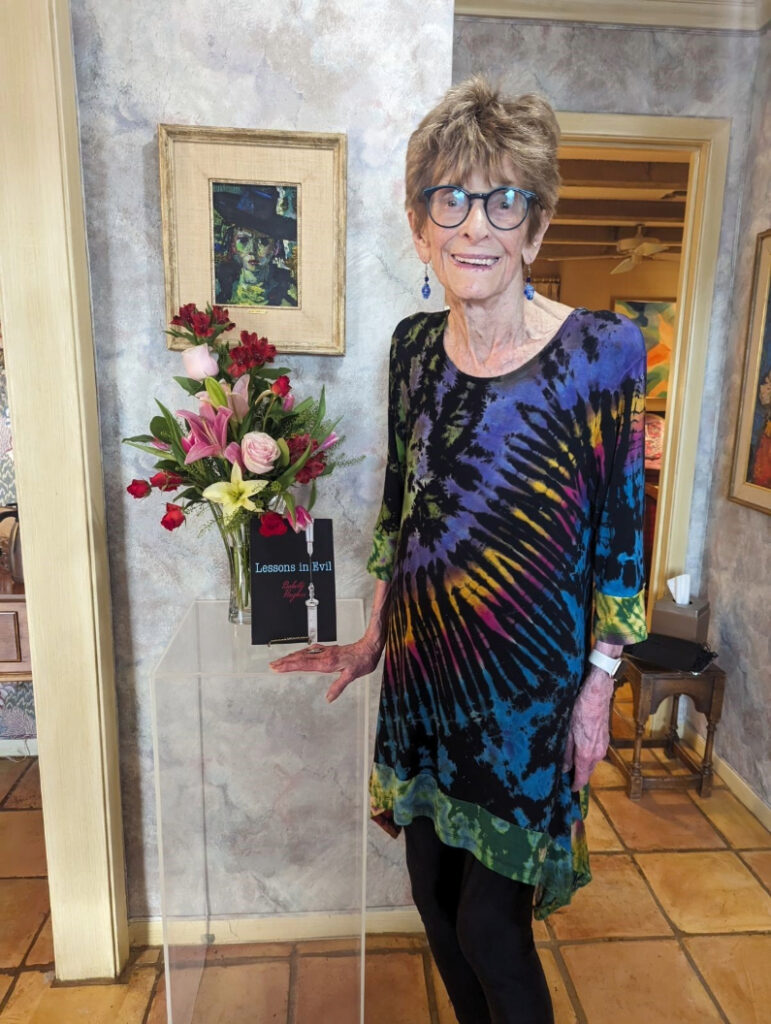Explore author Babette Hughes’ inspiring life, family tragedies and the creative force behind her latest novella, Lessons in Evil.
By Isabel Neumann. Photo by Susie Welch
Born in 1922, Babette Hughes is an author whose life is marked by tribulation, including family trauma, not to mention the societal constraints of the 1950s. Despite these hardships, she has embraced a prolific writing career, producing nine books. Her latest, Lessons in Evil, explores the Holocaust and its contemporary relevance. Her resilience in the face of adversity, including macular degeneration, challenges societal expectations about aging. Hughes’ novels, while not explicitly for Holocaust education, organically contribute to awareness. As she celebrates her 101st birthday, Hughes stands as a testament to the enduring power of creativity and pushes against cultural perceptions about aging, inspiring readers with her unique perspective on history, emotions and the human spirit.
Tell us about yourself. Who is Babette Hughes?
My own life has been very tumultuous. My father and uncle were murdered. My father was a bootlegger and got into an argument with the mafia. This was in 1924. I was 2 years old. Those early traumatic years really informed my writing, my identity and the problem of shame from the murders that my family experienced. I’m 101, and I have a lot to say about getting older too. I’m determined to have a life no matter how old I am. I find that most people in my age bracket, or even younger, have taken on the culture that aging is the end. That is what we are all told living in this culture, that youth is good and age is bad. In writing this novella, I disproved the notion that aging makes you less valuable.
What is the inspiration behind Lessons in Evil?

With the news cycle and everything that’s going on with antisemitism today, I wanted to write a story that would toggle back and forth between Nazi Germany and current times, reminding us of the mantras “always remember” and “never forget.” The inspiration came from the horrors. This book is a fictionalized story of my own involvement in the Holocaust in a creative way that made me feel better, that I was doing something, that I was expressing something that needed to be expressed by me and by others. Although it’s fiction, the stories in the novella are taken from reality. It gets at what I wanted it to get at, which is a view of the people that lived through the Holocaust either by being there or by hearing about it. We must keep these realities, these stories, alive.
How does the novella emphasize the idea that being aware of history is crucial to preventing its repetition?
I think it’s just written there. It’s just a layer down from the plot. It has been said that if we don’t know history, we’re doomed to repeat it. I didn’t set out to make that point. I set out to tell a story, but in doing so, I made that point. I think that people can both consciously and unconsciously understand it.
What do you want people to take away from your novella?
My hope is that the novella raises people’s consciousness, and they understand how important it is not to forget. We have slogans, and they’re fine, but it must be more than “don’t forget” or whatever mantra we pick up. I think it can reach social [media], other places. For example, we talked about getting older. Wouldn’t that be a wonderful thing for older people, whose generation, perhaps, was in the Holocaust, or they lost someone in the Holocaust, to get involved in keeping it alive? That is my hope; that we remember these horrors to keep them alive and, therefore, never repeat them.








